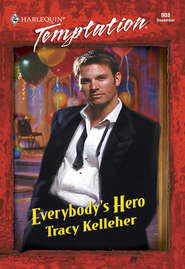По всем вопросам обращайтесь на: info@litportal.ru
(©) 2003-2025.
✖
The French Connection
Автор
Год написания книги
2018
Настройки чтения
Размер шрифта
Высота строк
Поля
Shelley nodded. “I see.” She didn’t at all. “Your English, both of your English, rather, is—” she searched for the appropriate word “—remarkable.”
The two women beamed.
“Mademoiselle Bruce would have been so delighted to hear that.” Marie-Jeanne patted her pearls.
“She was our governess when we were young,” Isabelle corrected. “She had a great fondness for shortbread.”
You could take the girl out of Scotland, Shelley realized, but you couldn’t take the Scottish burr out of her students.
The kitchen timer sounded and Isabelle opened the door to a giant oven and removed a large tart. “The, the, eh—” Isabelle turned to Marie-Jeanne. “Comment dit on ‘des mûres’ en anglais?”
Her sister thought a moment. “Raspberries, perhaps? I am not sure.” She rolled the r and pronounced the p.
Shelley looked more closely at the freshly baked pastry. “Blackberries,” she corrected. The last time she had had blackberries was when her family took a week’s camping trip to Vermont to savor the wonders of the Green Mountains and maple syrup. Unfortunately, her parents had not known that May was blackfly month. Her father had abandoned the rest of the family soon after, taking the insect repellent with him.
Isabelle placed the tart on a trivet and smiled. “Yes, blackberries, of course. I thought we would have tea later, if it is not too much trouble?”
“Not at all,” Shelley said. Food tended to relax people, and seeing as it was just tea, she didn’t think there would be an issue over the flatware. In any case, it was the perfect opportunity to start the negotiations. “And will the count be joining us?”
Marie-Jeanne smiled wistfully. “If only.”
Isabelle sighed. “That would be lovely, no?”
That would be lovely, yes, Shelley thought, seeing as he was the sole heir to the estate. “Perhaps you could call and invite him to come?”
Marie-Jeanne shook her head. “I am sure that he is much too busy.”
Isabelle nodded. “His work, it is very important.”
“And secretive.”
“It occupies him all hours of the day and night—forces him to travel constantly from his headquarters in Paris.”
“You make it sound like some kind of undercover operation.” Shelley was intrigued.
Marie-Jeanne coughed and covered her mouth.
Isabelle pursed her lips and looked to her sister.
“La pâte dentifrice,” Marie-Jeanne supplied.
Shelley blinked. “La pâte dentifrice? Toothpaste?” Isabelle nodded vigorously. “Yes, toothpaste. International sales.”
Well, whoop-de-do. The count might be concerned with the highly competitive world of tartar control, but she had the IRS breathing down her neck. Cavities would just have to take a back seat. “Yes, I can understand the pressing nature of his business, but at the risk of being rude, I really do need to speak with him as soon as possible. As I am sure you are well aware, the count plans to terminate the contract with Dream Villas.”
The two women looked at each other, then back at her, nodding nervously.
“Please understand, in no way do I mean to be disrespectful to the memory of the late comtesse, but I was very much hoping to use this opportunity to get the chance to dissuade the count of his decision.” Her muddled syntax was beginning to resemble the sisters’. Shelley hoped that was not a bad omen.
Marie-Jeanne waved off her apology. “It is impossible to be crass when referring to that woman. Françoise was no better than that Mary Astor character in The Maltese Falcon. How she treated poor Humphrey Bogart!” Marie-Jeanne’s distress was evident.
Shelley’s was verging on mild hysteria.
“You must forgive Marie-Jeanne her outburst. She is a true fan of Raymond Chandler,” Isabelle explained.
“Oh.” Shelley nodded, wondering if it would be considered rude if she asked for a double scotch on the rocks.
“My literary weakness aside, please continue,” Marie-Jeanne commanded. “We will dismiss further mention of that woman.”
The fact that no love was lost was becoming clearer and clearer. “Yes, well, let me explain. You see, I have always been a practical kind of person.”
“Something we have also greatly admired about you,” Isabelle noted politely. “The way you organized the electricians to come and put in those modern connections—circuit breakers, I believe they are called—was exceptional, truly magnifique.”
“Thank you, but that is really just part of my job.”
“Never underestimate efficiency,” Marie-Jeanne declared.
“Well, thank you again.” Maybe they could write a letter of recommendation for a new job if she was unsuccessful in convincing their nephew to come around? No, best not to be negative.
Shelley forged on. “Speaking of efficiency, don’t you think it would benefit the family to keep renting out the chateau? That way you could maintain a regular income and have the satisfaction of knowing that the property would remain in the family and that you could still live on the grounds?” She stopped to gauge their reaction. “I’m sorry, I don’t mean to be too blunt, and of course someone could easily argue that my motives are not completely pure—after all, the suggestion to keep the contract with Dream Villas also benefits me.” If they only knew how much.
“You have nothing to be sorry about,” Isabelle assured her.
“In truth, we were reluctant to interfere in the decision regarding the estate and burden Edmond with our little problems. But we have been wondering where we will go if the chateau is to be sold,” Marie-Jeanne confided.
“Then for your sakes and mine, I must tell you that I am here in Aix-en-Provence only until the end of the week, Monday at the latest. Therefore, if I am to convince Monsieur le Comte to maintain a business connection, I must do it soon. Today even.” Shelley looked back and forth between the two sisters.
Marie-Jeanne fingered her pearls. Isabelle toyed with her ring. And Shelley wondered if the two old women, who seemed more attuned to a bygone era of black-and-white movies and governesses, were capable of strong-arming their high-flying businessman of a nephew, who appeared to be oblivious to his family’s needs. Perhaps this is what too much fluoride did to one’s thinking?
Marie-Jeanne squared her narrow shoulders and stood up even straighter than before, as much a testament to her moral fiber as to her upbringing. “Isabelle, perhaps you would be so kind as to take Shelley on a tour of the chateau while I place a call to Edmond?” Marie-Jeanne elongated the pronunciation of her name—Shell-ee—in a charming and very un-Lionel way. She started to leave but stopped. “If I may be so bold, may I inquire as to your relationship with Monsieur Toynbee?”
Shelley straightened her back—in horror and as a testament to her passing the President’s Fitness Test in middle school three years running. “He’s my employer, nothing more, I can assure you.” And possibly not my employer for much longer—though Shelley didn’t add that part.
Isabelle beamed at her sister. “You see, I said she was remarkable.” She turned to Shelley. “For you, it is the Botticelli and nothing less.”
3
ACTUALLY IT WAS MORE.
First came the chateau’s library, with hundreds of leather-bound volumes—a books-by-the-yard fantasy come true. Only these looked as if someone had used them for more than decoration.
Someone had.
“As a young boy, Edmond, the new count, spent many hours reading the works of Thucydides and Virgil—in the original Greek and Latin, of course,” Isabelle explained with a sweep of the hand.
“Was Mademoiselle Bruce his tutor, as well?” Shelley asked somewhat distractedly. She had just noticed what appeared to be a Gutenberg bible.
“Oh, no, Mademoiselle Bruce had already returned to her native Glasgow. Edmond mastered Greek on his own when he was recuperating from a fall from the oak tree behind the stables. He was pretending to be Rinaldo from Gerusalemme, off to fight the Saracens. You know the poem by Tasso, of course?”











